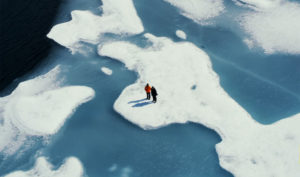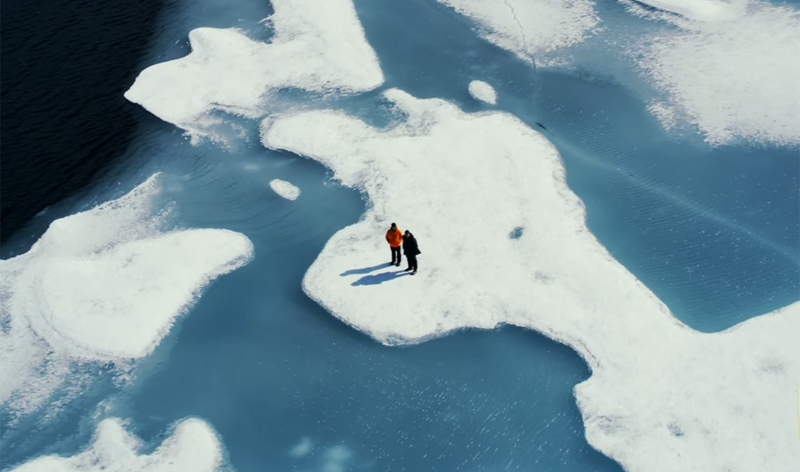Last updated on April 19, 2018

Scientists studied Arctic icemelt as part of NASA’s ICESCAPE mission
Irreversable global disaster from climate change is not only possible, but probable—perhaps inevitable—according to Rick Nolthenius, Cabrillo’s resident planetary climatologist.
2016 marks the 30th anniversary of Rick’s tenure as professor of Astronomy at Cabrillo. His prior occupations include aerospace thermal engineering for spacecraft and a post-doctoral fellowship in astrophysics at the University of Arizona.
An avid cyclist and triathlete, Rick fell in love with Santa Cruz on his first visit, which not surprisingly was on a bicycle tour over Highway 9. Accepting his position at Cabrillo allowed him fulfill two of his loves, teaching and performing astronomical research at UCSC.
In an interview with the Voice, Professor Nolthenius described how dangerous the years ahead will be, why, and what he sees as our responsibility to avert a severely transformed world.
How does climate change compare to nuclear war or a major meteor impact as a threat to our way of life?
Climate change is far more of a threat to our way of life than either a meteor impact or nuclear war. We’ve discovered nearly all the asteroids big enough to cause major trouble, and the odds of a bad hit are very close to zero. Nuclear war is higher odds, but I believe remote—except perhaps from societal breakdown due to climate change causing desperation. But serious climate change is a near certainty.
Is the term “global warming” interchangeable with “climate change”?
Yes, they’re interchangeable. A republican strategist came up with re-branding “global warming” as “climate change” because it sounded less concerning and so would be easier to dismiss, back around 20 years ago.
Is there undeniable evidence that climate change is real with humans contributing to it?
Yes. Over a dozen lines of evidence show not only that humans are contributing, but that there are NO other causes for global warming. In fact, all non-human climate change causes are summing to produce a slight cooling effect since the 1950s. Humans are 100% responsible for 100% of the warming we are seeing.
Is the cause from particulate exhausts or gases we can’t see?
Throughout nearly all of the millions of years for which we have good enough data, CO2 levels prove to be the prime determiner of Earth’s climate.
Humans’ two biggest contributions to climate are CO2 from fossil fuel burning—warmer climate forcing—and particulate air pollution that has a cooling effect, but less than CO2’s warming. It is highly unfortunate and little talked about, but if we end coal burning and switch entirely to natural gas instead, the effect will be a significant HEATING effect to Earth climate, because of the loss of reflective smog, which cools the Earth underneath. Coal is nasty and causes horrible diseases, but it also helps offset the heating from CO2.
In a phrase, how would you describe those who refute that climate change is real?
“Refute” is too honorable a word—that implies logic and argumentation involved from climate denialists. But research studies published in a number of science journals, including in psychology, show that climate denialism is linked to political conservatism which is itself correlated to paranoid conspiracy beliefs, to larger brain mass in the amygdala which is the operations center for fear, and reduced brain mass in the areas which perform critical thinking and error-detection.* Unfortunately, the evidence is pretty strong that you can’t reason with the large majority of climate denialists – they’re not open to evidence and logic.
How is climate change evolving over time?
It is accelerating rapidly, far more rapidly than old mid-case climate models by the Intergovernmental Panel on Climate Change (IPCC) predicted. Those models failed to include many important amplifying climate feedbacks, and their policy statements were so hedged and watered down by the UN political interference in the IPCC publication process, that it is not surprising that every IPCC Assessment report has proven to be an understatement and underestimate of where climate would be, even just a few years into the future.
What are the most serious consequences that our children will inherit?
There are many, and they’re all serious. Rising sea levels first; studies show that even just at current CO2 concentrations most of Greenland and a significant amount of Antarctica are doomed to melt.
“Business as usual” rising carbon emissions leads eventually to large areas of the tropics likely to become too hot to support mammals, including humans (but more likely that we’ll never get there, as societal breakdown would happen before this). Tropical diseases will spread north, and already are, including Zika, causing microencephaly in newborns.
The global ocean circulation could shut down in a few decades, which would lead to storms especially in the Atlantic which would be much, much stronger than anything possible today, according to work from Professor James Hansen [formerly of NASA and the Goddard Institute for Space Studies] and others. Large scale crop failures as well.
Wars will break out over remaining livable land and food—climate change is judged by the Defense Department as being the single greatest threat to national security. We’re already seeing the beginnings of this, with famines in the mid-East leading to what is being called the greatest refugee crisis to hit Europe since World War II. Walls, increased nationalism and border defenses, and the rise of political demagogs are already here.
What can we do personally to fight climate change?
Individually, you can bicycle and walk whenever possible, install solar panels, etc. But done only on a voluntary level, these won’t affect global climate significantly. What is needed is dramatic and universal action on a global policy level.
I advocate for a 28th Amendment to the Constitution, guaranteeing the right of future generations to unspoiled commons—ocean, air, forests. I’m on record advocating for a million person occupation of Washington DC until such legislation is passed. A peaceful occupation, but with no intention of leaving until such legislation is enacted. A million person occupation, which would be impossible for the press to ignore, and might inspire young people across the country to join in.
It is supposed to be our government, but the evidence is overwhelming that it is not. In 2014, Princeton researchers Gilens and Page studied all legislative bills introduced during the prior 20 years, during both Republican and Democratic administrations and congresses, and found there was exactly ZERO correlation between what the average citizen desired and what legislation was actually enacted. They found instead that the large corporations and their lobbies control our government. Gilens and Page prove that the system is broken, and works only for those whose sole motivation is extracting money as efficiently as possible from where it can be had, regardless of costs to our future.
If we stop what we’re doing wrong, will Earth’s climate stabilize or become cooler again?
No, it won’t become cooler. Worse.
If global civilization somehow, impossibly, ended all fossil fuel burning tomorrow, the existing imbalance would prevent temperatures from going back down, even though CO2 levels would drop somewhat. Numerous studies in top journals show this. It’s not controversial. This is what is so tragic.
The physics of climate guarantee that global average temperature is a ratchet. It only goes up, it cannot go back down. New research in 2016 even indicates that stopping all anthropogenic emissions, still results in rising temperatures, as climate sensitivity to CO2 looks to be higher than thought, and because the melting permafrost carbon feedback has been triggered.
Are there any fixes that we can possibly make as a species?
The only way to try and REDUCE temperatures in an ongoing way, is to not only end all carbon emissions, but to go further and pull out massive amounts of atmospheric CO2 and somehow sequester it. We don’t know how to do this.
On a temporary basis, we could cool the Earth with continual flying of special jets dispersing sulfate aerosols into the lower stratosphere, performing the same cooling that volcanic eruptions do, by making a reflective layer above us. However, the moral hazard with this is that we continue burning fossil fuels, adding CO2, worsening ocean acidification and the collapse of vital ecosystems which depend on aragonite-making species such as phytoplankton and corals. Unknown to many people because of a silent corporate press, already most of the greatest coral reef system on Earth—Australia’s Great Barrier Reef—died in 2016.
At this late date, we cannot halt crippling climate change, we can only try to prevent it from reaching catastrophic proportions, but even that will take far more effort than is recognized.
This is a quote from Professor James Hansen whom you referred to earlier: “Our Founding Fathers believed you need a revolution every now and then to shake things up—we have certainly reached that time.”
Amen!! We absolutely do. 30 years ago we needed one for climate. Today— it’s too late to save ourselves from some bitter “schooling” at the hands of physics.
There is this stubborn hope and belief, fed by a complacent and silent mainstream media—that climate is just another one of our many issues and if we just tweek some things here and there and throw some money at it, we can solve it.
Climate and civilization both, are lumbering giants. Slow-moving by human attention span measures, but as hard to stop as a giant asteroid.
Hansen thinks that the world will be even more dangerous if we don’t turn to nuclear power. Is he right?
Yes, the newer and much safer designs of breeder reactors can be not only a source of power, but can also “burn” for fuel the massive tons of nuclear waste we’ve barrelled and don’t know what to do with, but new reactors likely can’t be finalized, approved, permitted, and deployed in time to pull us back from our dilemma.
Hansen is not happy with Barack Obama’s record on climate and would grade him a ‘D,’ and sadly ineffective. How do you feel about the former President?
As much as I feel Obama was the most likeable president of my lifetime—yeah, Hansen is absolutely correct. He had a golden 2 years in ‘08 when he could have done so much, and instead, he did nothing to deal with climate, or stand up and fight the disgraceful smear campaign run by Big Oil and their fakenews “ClimateGate”, which did so much harm.
What message or plea do you have for the generation of young people who are your current students?
You have been betrayed—by our national leaders, by the lies of Big Oil, and even by some educators, for decades. So the first step in assessing what is necessary to do, is to understand the magnitude of the problem. This is why I teach Astro 7 “Planetary Climate Science.”
As Leonardo DiCaprio said in his documentary on climate Before the Flood, “we used to think that changing our light bulbs could make the difference. But it’s clear now that we’re way beyond that.”
No point in bringing a pea-shooter to a gun fight. Learn the true dimensions of the climate problem. CO2 is the most global of all environmental problems. Only global action can affect local (and global) climate. It’s a response that demands an emergency mentality.
This is an emergency, it just doesn’t look like one because it is happening in such slow, yet inevitable, motion. We must, by way of government enforced law, go beyond what’s comfortable, and do what is Spartan and uncomfortable, and severely cut global growth as well as rapidly decarbonize our energy, as well as invent and deploy the means for atmospheric CO2 removal. If we do, rather than just acquiring more and sparklier stuff, our rewards will be inner rewards, a gift to future generations and to the other species we share this unique planet with. ◆

